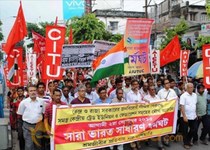Chennai/New Delhi: Financial services were hit on Wednesday as lakhs of bank and insurance employees across the country began a one-day strike to protest against the anti-trade union and worker policies of the central government.
"The strike has begun on an encouraging note across the country as per the initial information. Employees of the Reserve Bank of India (RBI), nationalised banks, old private sector banks, cooperative banks, regional rural banks are participating in the strike," All India Bank Employees' Association (AIEBA) general secretary C.H. Venkatachalam told IANS in Chennai.
According to him, strike is a success in major cities like Mumbai, Delhi, Chennai and Kolkata.
Across the country, around 500,000 bankers - workers and officers - would be participating in the strike. Around 75,000 branches will not function.
Unions in State Bank of India (SBI) and Indian Overseas Bank (IOB) are not participating in the strike.
"All the major recognised unions representing Class III and IV employees in Life Insurance Corporation of India (LIC) and four government owned non-life insurers are participating in the strike," J. Gurumurthy, vice president, All India Insurance Employees Association (AIIEA) told IANS.
Some 100,000 LIC workers are estimated to be on strike.
Unions in the non-life insurance sector are demanding early conclusion of wage negotiations, finalisation of the promotion policy and scrapping of outsourcing, among other demands.
Transport unions in the country are also striking work over the proposed Road Transport and Safety Bill.
"All 52 regional rural banks apart from district banks joined the strike," Venkatachalam said.
"Besides, employees of other important banks like IDBI, Nabard too have joined the strike," he said.
"Except the State Bank of India and Indian Overseas Bank, all other banks have joined the strike. Kotak Bank is on strike," the AIEBA general secretary added.
The strike was called in support of the 12-point charter of demands of the 10 central trade unions. Fourteen unions in the banking sector too have given a call for the strike, protesting against the NDA government's proposed bills amending labour laws, the Contract Act, the Electricity Act and Factory Act.
The unions in the banking and insurance sectors are participating in the strike in support of the 12-point charter as well as other pressing issues in their sectors.
Complaining of increasing attacks on the rights and privileges of workers and concessions extended to the employers, Venkatachalam said there are open attempts to amend labour laws in favour of the employers and to the detriment of the workers.
The neo-liberal economic policies are only aggravating the problems of the workers and common masses, he said.
Venkatachalam said in the banking sector, there are continuous attempts to push through the reforms agenda aimed at privatisation of banks, consolidation and merger of banks and others.
"More and more private capital and foreign direct investments are being encouraged. Private sector companies are being given licences to begin banking business," he said.
According to him, Regional Rural Banks are sought to be privatised and a bill has been passed in parliament despite protests from employee unions.
The real problem of increasing bad loans is not being effectively handled by the government but on the other hand, crore of rupees are being written off from profits of banks, Venkatachalam said.
"Deliberate and willful default of bank loans should be termed a criminal offence and money recovered but no action is being taken on them," he added.
"As on March 31, 2015, there are 7,035 cases of wilful defaulters involving bad loans of Rs.58,792 crore.
"The bad loans in the banks as on March 31, 2015, has risen to Rs.2,97,000 crore in addition to another Rs.4,03,004 crore of bad loans of 530 corporate companies shown as rescheduled and restructured loans under CDR (corporate debt restructuring) scheme," Venkatachalam said.
According to him, bad loans struck up in top 30 borrowal accounts of public sector banks as on March 31, 2015, is Rs.1,21,162 crore.
"More and more private capital and foreign direct investments are being encouraged. Private sector companies are being given licences to begin banking business," he said.







